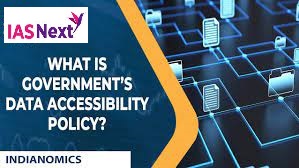CURRENT AFFAIRS
Get the most updated and recent current affair content on Padhaikaro.com
Data Accessibility Policy
- IAS NEXT, Lucknow
- 02, Mar 2022

Reference news:-
The Ministry of Electronics and Information Technology (MeitY) has come out with a draft Data Accessibility and Use policy.
Highlights of the policy:
- The policy proposes to improve data availability, quality and use in line with the decade’s current and emerging technology demands.
- Any data sharing shall happen within the legal framework of India, its national policies and legislation as well as the recognized international guidelines.
- All data and information generated, created, collected, or stored by the central government and authorised agencies shall be covered by the policy.
- Applicability: All government data will be open and shareable unless it falls under a negative list of data sets, categorised under the negative list of datasets that won’t be shared; and restricted access and shared only with trusted users, as defined by the respective ministry or department, under the controlled environment.
Important bodies proposed to be created:
- It proposes the establishment of anIndia Data Office (IDO) to streamline and unify data access and sharing among government and other stakeholders.
- In case of the institutional framework, the draft noted that every ministry or department should have Data Management Units, headed by Chief Data Officers, which will work closely with the IDO to ensure the implementation of this policy.
- India Data Council — comprising IDO and chief data officers — shall be constituted with the objective of undertaking tasks that require deliberation across ministries, departments and state governments.
Expected policy outcomes:
- Unlocking high-value data across the economy.
- Facilitating a congruent and robust governance strategy.
- Realising an interoperable digital infrastructure.
- Data skills and data-driven culture.
Concerns:
- Lack of transparency in the consultation and drafting process: The process of consultation has not been transparent.
- Perverse revenue objective: The ‘Preamble’ of the policy states that “India’s ambition of becoming a 5 trillion-dollar digital economy depends on its ability to harness the value of data”. With this, it appears that revenue generation through sale of citizen data emerges is the primary objective of the Policy.
- Harmful effects on informational privacy of citizens: In the absence of a personal data protection law, the envisaged interdepartmental sharing of data across the government departments may lead to a massive violation of the privacy of citizens.
- Lack of clear & concise definitions for key concepts: New concepts introduced by the Policy have been defined in a vague and ambiguous manner which opens them up to misinterpretation.
- For example, the Policy creates a separate category of ‘High-Value Data Sets’ which it deems essential for governance and innovation, access to which will be accelerated. However, nowhere in the Background Note or the Policy has the category been concisely defined.